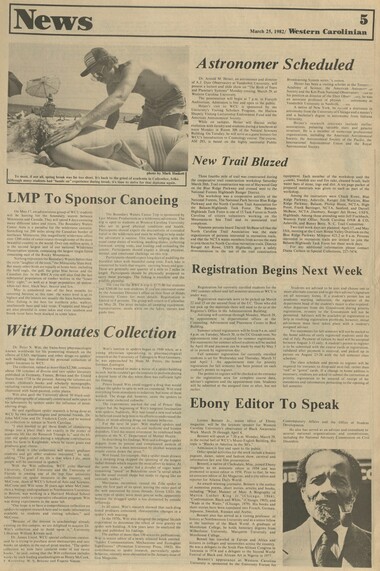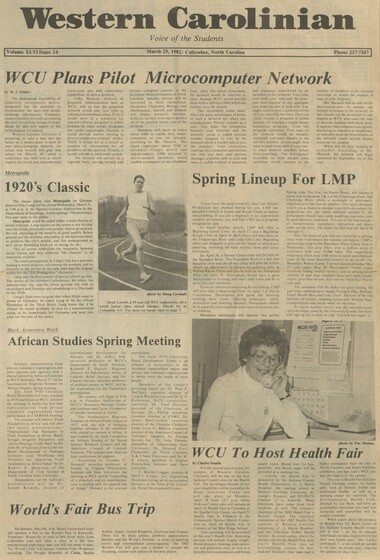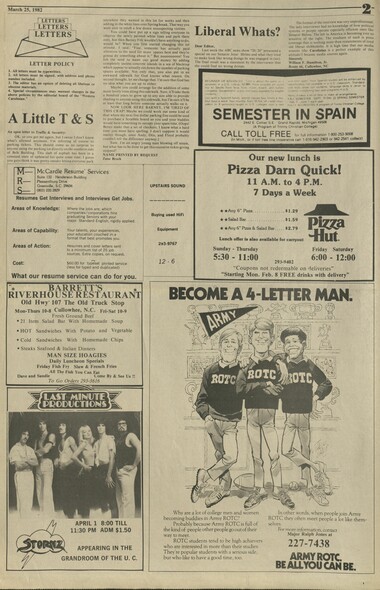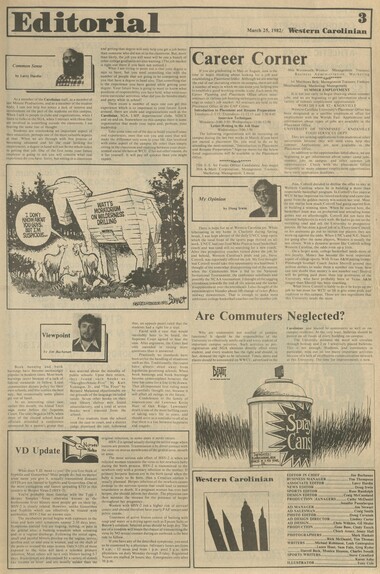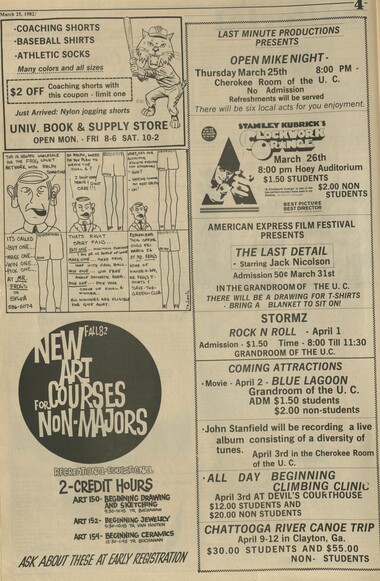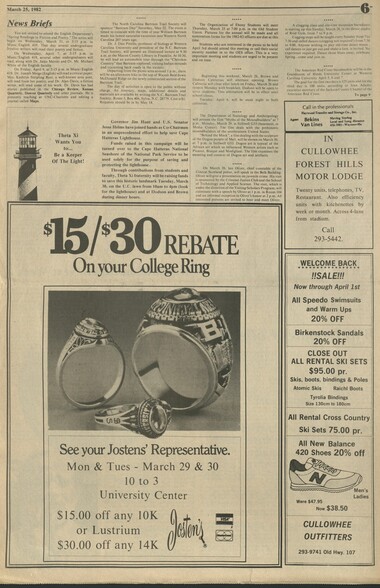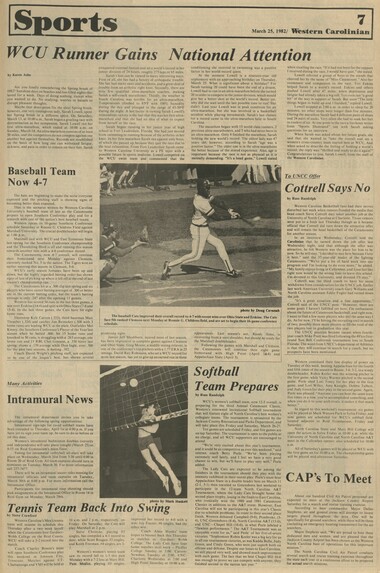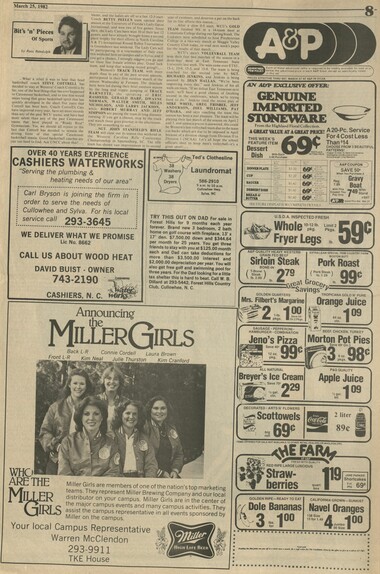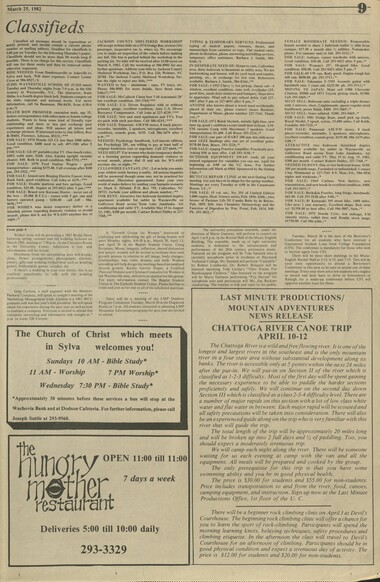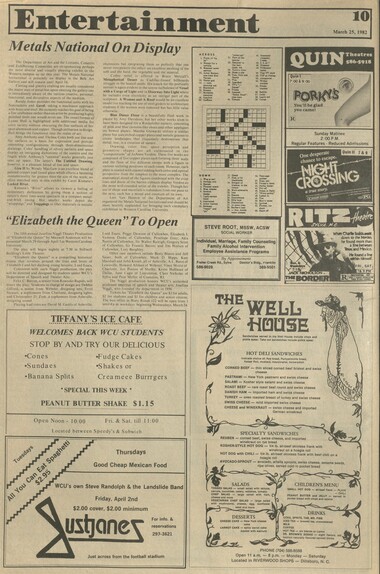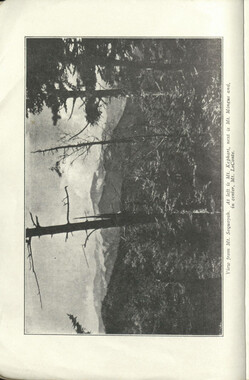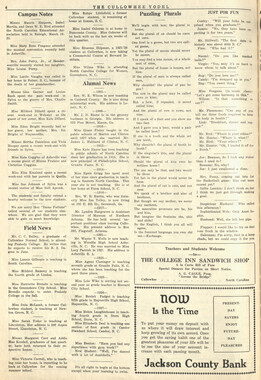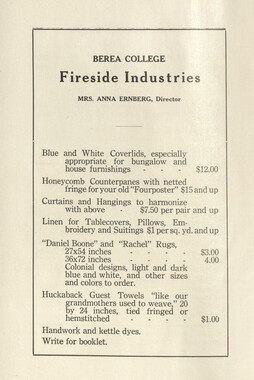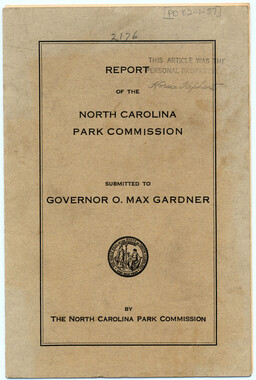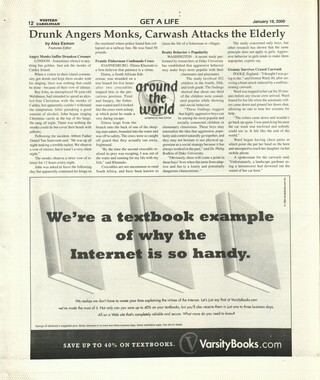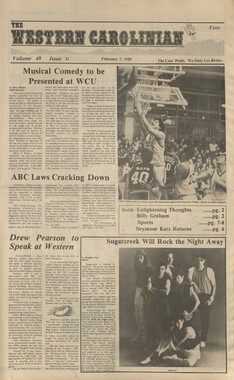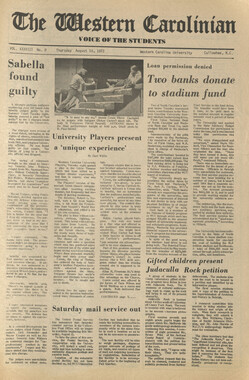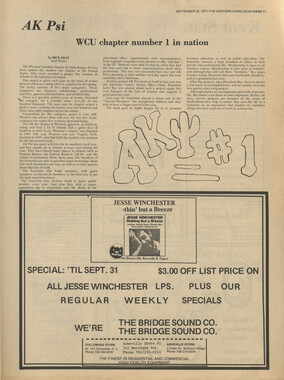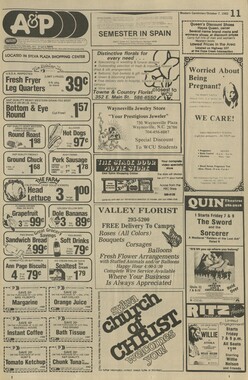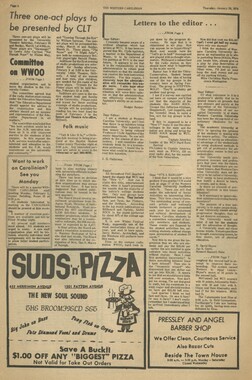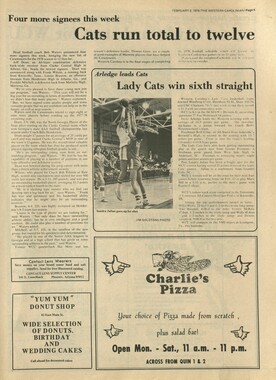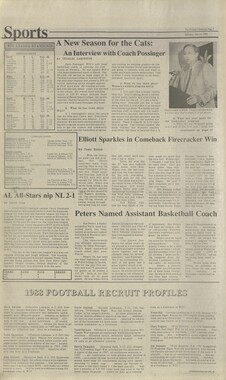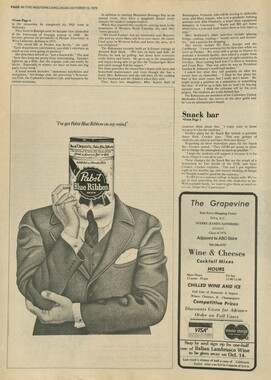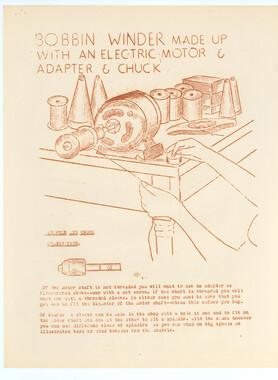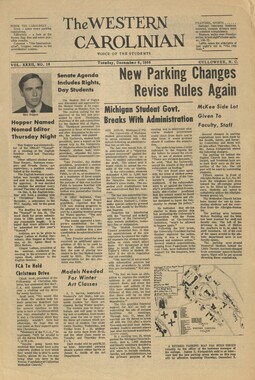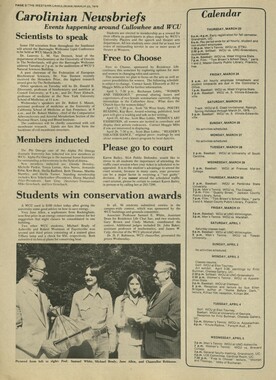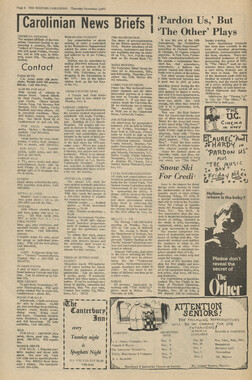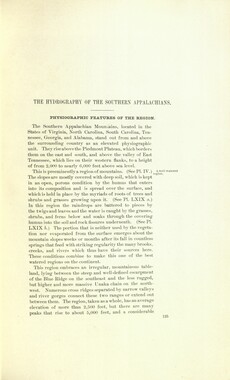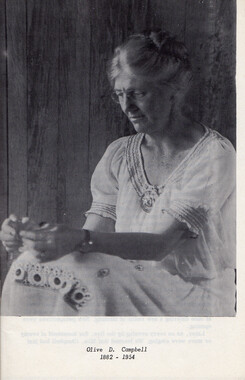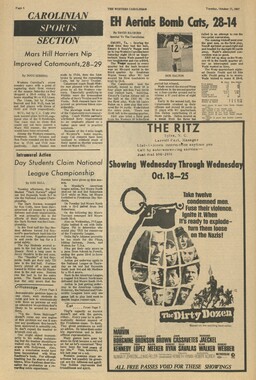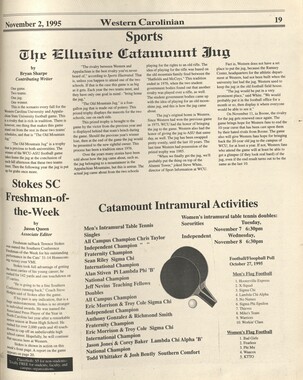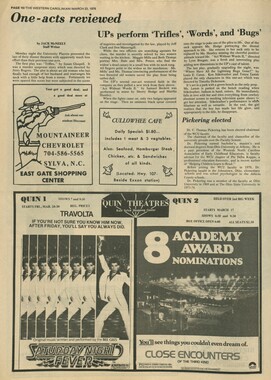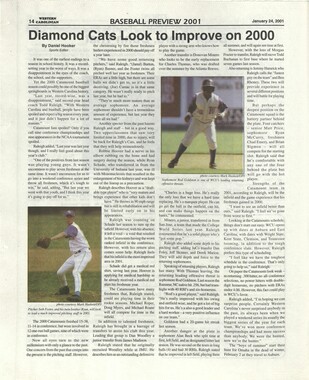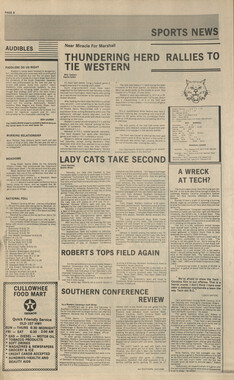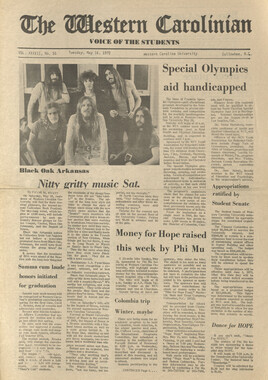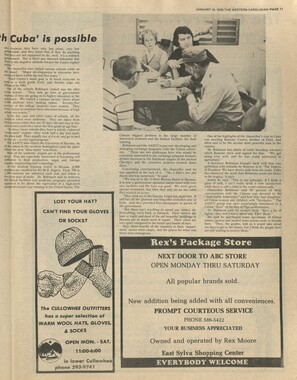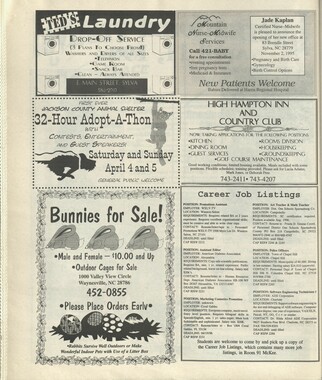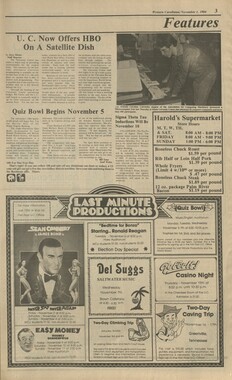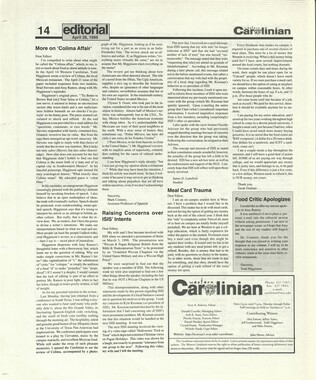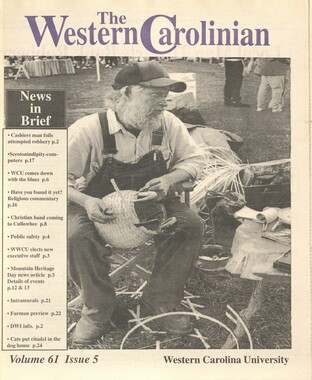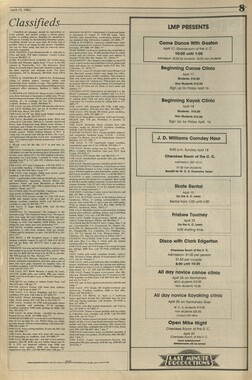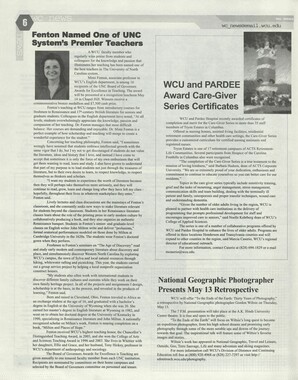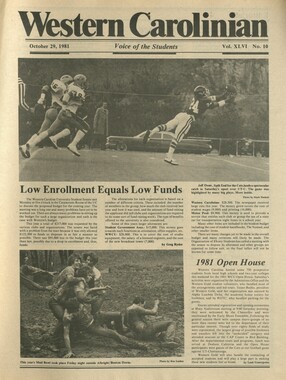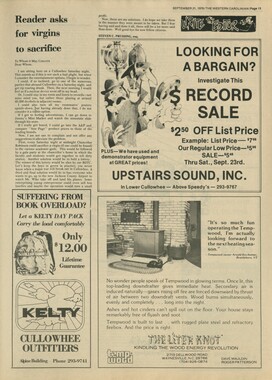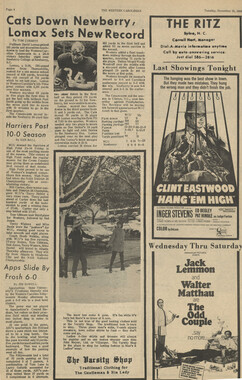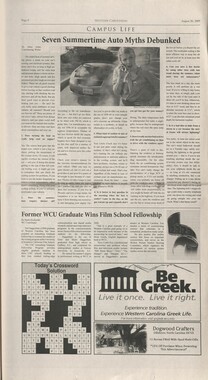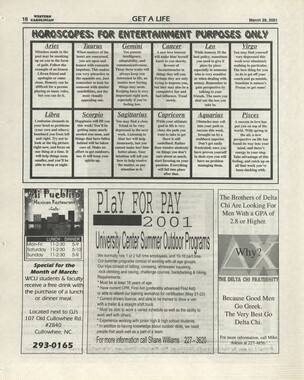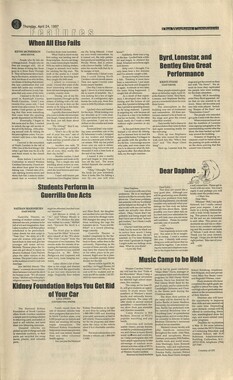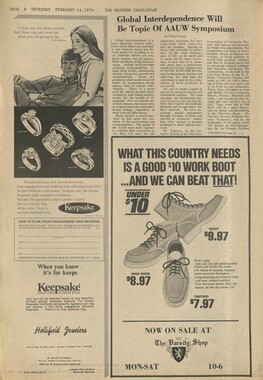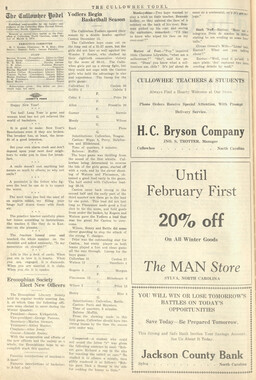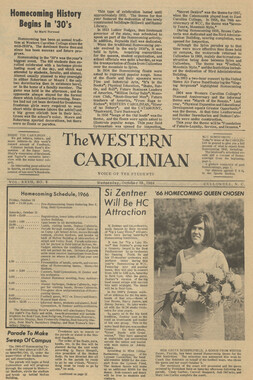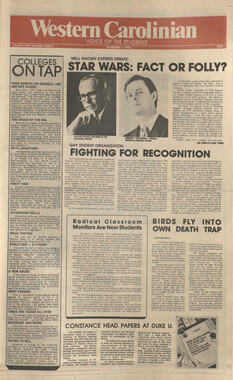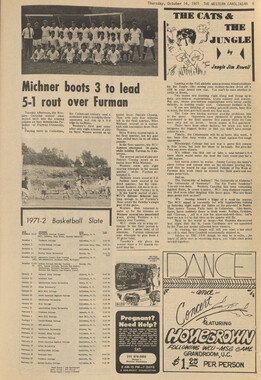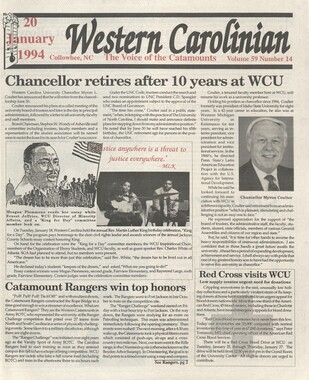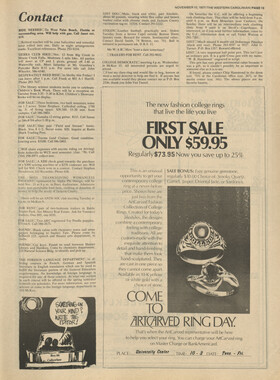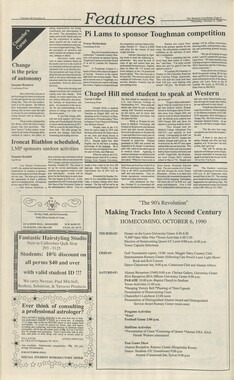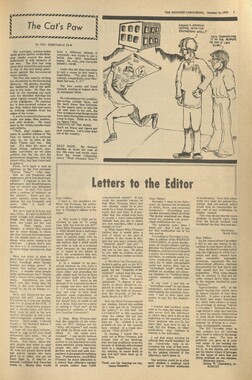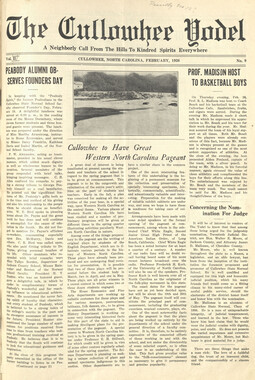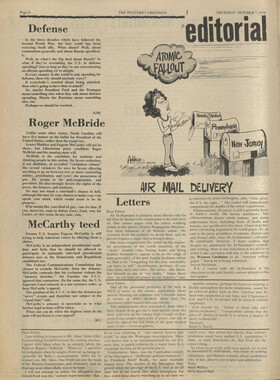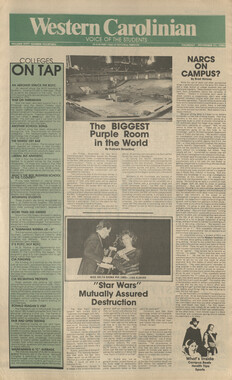Western Carolina University (20)
View all
- Canton Champion Fibre Company (2308)
- Cherokee Traditions (291)
- Civil War in Southern Appalachia (165)
- Craft Revival (1942)
- Great Smoky Mountains - A Park for America (2946)
- Highlights from Western Carolina University (430)
- Horace Kephart (941)
- Journeys Through Jackson (159)
- LGBTQIA+ Archive of Jackson County (85)
- Oral Histories of Western North Carolina (314)
- Picturing Appalachia (6798)
- Stories of Mountain Folk (413)
- Travel Western North Carolina (160)
- Western Carolina University Fine Art Museum Vitreograph Collection (129)
- Western Carolina University Herbarium (92)
- Western Carolina University: Making Memories (708)
- Western Carolina University Publications (2412)
- Western Carolina University Restricted Electronic Theses and Dissertations (146)
- Western North Carolina Regional Maps (71)
- World War II in Southern Appalachia (131)
University of North Carolina Asheville (6)
View all
- Allanstand Cottage Industries (62)
- Appalachian National Park Association (53)
- Bennett, Kelly, 1890-1974 (1388)
- Berry, Walter (76)
- Brasstown Carvers (40)
- Carver, George Washington, 1864?-1943 (26)
- Cathey, Joseph, 1803-1874 (1)
- Champion Fibre Company (233)
- Champion Paper and Fibre Company (297)
- Cherokee Indian Fair Association (16)
- Cherokee Language Program (22)
- Crowe, Amanda (40)
- Edmonston, Thomas Benton, 1842-1907 (7)
- Ensley, A. L. (Abraham Lincoln), 1865-1948 (275)
- Fromer, Irving Rhodes, 1913-1994 (70)
- George Butz (BFS 1907) (46)
- Goodrich, Frances Louisa (120)
- Grant, George Alexander, 1891-1964 (96)
- Heard, Marian Gladys (60)
- Kephart, Calvin, 1883-1969 (15)
- Kephart, Horace, 1862-1931 (313)
- Kephart, Laura, 1862-1954 (39)
- Laney, Gideon Thomas, 1889-1976 (439)
- Masa, George, 1881-1933 (61)
- McElhinney, William Julian, 1896-1953 (44)
- Niggli, Josephina, 1910-1983 (10)
- North Carolina Park Commission (105)
- Osborne, Kezia Stradley (9)
- Owens, Samuel Robert, 1918-1995 (11)
- Penland Weavers and Potters (36)
- Roberts, Vivienne (15)
- Roth, Albert, 1890-1974 (142)
- Schenck, Carl Alwin, 1868-1955 (1)
- Sherrill's Photography Studio (2565)
- Southern Highland Handicraft Guild (127)
- Southern Highlanders, Inc. (71)
- Stalcup, Jesse Bryson (46)
- Stearns, I. K. (213)
- Thompson, James Edward, 1880-1976 (226)
- United States. Indian Arts and Crafts Board (130)
- USFS (683)
- Vance, Zebulon Baird, 1830-1894 (1)
- Weaver, Zebulon, 1872-1948 (58)
- Western Carolina College (230)
- Western Carolina Teachers College (282)
- Western Carolina University (1899)
- Western Carolina University. Mountain Heritage Center (18)
- Whitman, Walt, 1819-1892 (10)
- Wilburn, Hiram Coleman, 1880-1967 (73)
- Williams, Isadora (3)
- Cain, Doreyl Ammons (0)
- Crittenden, Lorraine (0)
- Rhodes, Judy (0)
- Smith, Edward Clark (0)
- Appalachian Region, Southern (2569)
- Asheville (N.C.) (1923)
- Avery County (N.C.) (26)
- Blount County (Tenn.) (195)
- Buncombe County (N.C.) (1672)
- Cherokee County (N.C.) (283)
- Clay County (N.C.) (555)
- Graham County (N.C.) (233)
- Great Smoky Mountains National Park (N.C. and Tenn.) (519)
- Haywood County (N.C.) (3569)
- Henderson County (N.C.) (70)
- Jackson County (N.C.) (4804)
- Knox County (Tenn.) (35)
- Knoxville (Tenn.) (13)
- Lake Santeetlah (N.C.) (10)
- Macon County (N.C.) (420)
- Madison County (N.C.) (215)
- McDowell County (N.C.) (39)
- Mitchell County (N.C.) (132)
- Polk County (N.C.) (35)
- Qualla Boundary (981)
- Rutherford County (N.C.) (76)
- Swain County (N.C.) (2135)
- Transylvania County (N.C.) (270)
- Watauga County (N.C.) (12)
- Waynesville (N.C.) (86)
- Yancey County (N.C.) (72)
- Aerial Photographs (3)
- Aerial Views (60)
- Albums (books) (4)
- Articles (1)
- Artifacts (object Genre) (228)
- Bibliographies (1)
- Biography (general Genre) (2)
- Cards (information Artifacts) (38)
- Clippings (information Artifacts) (191)
- Copybooks (instructional Materials) (3)
- Crafts (art Genres) (622)
- Depictions (visual Works) (21)
- Design Drawings (1)
- Drawings (visual Works) (185)
- Envelopes (73)
- Exhibitions (events) (1)
- Facsimiles (reproductions) (1)
- Fiction (general Genre) (4)
- Financial Records (12)
- Fliers (printed Matter) (67)
- Glass Plate Negatives (381)
- Guidebooks (2)
- Internegatives (10)
- Interviews (815)
- Land Surveys (102)
- Letters (correspondence) (1013)
- Manuscripts (documents) (618)
- Maps (documents) (177)
- Memorandums (25)
- Minutes (administrative Records) (59)
- Negatives (photographs) (6015)
- Newsletters (1290)
- Newspapers (2)
- Notebooks (8)
- Occupation Currency (1)
- Paintings (visual Works) (1)
- Pen And Ink Drawings (1)
- Periodicals (193)
- Personal Narratives (10)
- Photographs (12976)
- Plans (maps) (1)
- Poetry (5)
- Portraits (4539)
- Postcards (329)
- Programs (documents) (151)
- Publications (documents) (2364)
- Questionnaires (65)
- Relief Prints (26)
- Sayings (literary Genre) (1)
- Scrapbooks (282)
- Sheet Music (2)
- Slides (photographs) (402)
- Songs (musical Compositions) (2)
- Sound Recordings (796)
- Specimens (92)
- Speeches (documents) (15)
- Tintypes (photographs) (8)
- Transcripts (322)
- Video Recordings (physical Artifacts) (23)
- Text Messages (0)
- A.L. Ensley Collection (275)
- Appalachian Industrial School Records (7)
- Appalachian National Park Association Records (336)
- Axley-Meroney Collection (2)
- Bayard Wootten Photograph Collection (20)
- Bethel Rural Community Organization Collection (7)
- Blumer Collection (5)
- C.W. Slagle Collection (20)
- Canton Area Historical Museum (2110)
- Carlos C. Campbell Collection (462)
- Cataloochee History Project (64)
- Cherokee Studies Collection (4)
- Daisy Dame Photograph Album (5)
- Daniel Boone VI Collection (1)
- Doris Ulmann Photograph Collection (112)
- Elizabeth H. Lasley Collection (1)
- Elizabeth Woolworth Szold Fleharty Collection (4)
- Frank Fry Collection (95)
- George Masa Collection (173)
- Gideon Laney Collection (452)
- Hazel Scarborough Collection (2)
- Hiram C. Wilburn Papers (28)
- Historic Photographs Collection (236)
- Horace Kephart Collection (861)
- Humbard Collection (33)
- Hunter and Weaver Families Collection (1)
- I. D. Blumenthal Collection (4)
- Isadora Williams Collection (4)
- Jesse Bryson Stalcup Collection (47)
- Jim Thompson Collection (224)
- John B. Battle Collection (7)
- John C. Campbell Folk School Records (80)
- John Parris Collection (6)
- Judaculla Rock project (2)
- Kelly Bennett Collection (1407)
- Love Family Papers (11)
- Major Wiley Parris Civil War Letters (3)
- Map Collection (12)
- McFee-Misemer Civil War Letters (34)
- Mountain Heritage Center Collection (4)
- Norburn - Robertson - Thomson Families Collection (44)
- Pauline Hood Collection (7)
- Pre-Guild Collection (2)
- Qualla Arts and Crafts Mutual Collection (12)
- R.A. Romanes Collection (681)
- Rosser H. Taylor Collection (1)
- Samuel Robert Owens Collection (94)
- Sara Madison Collection (144)
- Sherrill Studio Photo Collection (2558)
- Smoky Mountains Hiking Club Collection (616)
- Stories of Mountain Folk - Radio Programs (374)
- The Reporter, Western Carolina University (510)
- Venoy and Elizabeth Reed Collection (16)
- WCU Gender and Sexuality Oral History Project (32)
- WCU Mountain Heritage Center Oral Histories (25)
- WCU Oral History Collection - Mountain People, Mountain Lives (71)
- WCU Students Newspapers Collection (1843)
- Western North Carolina Tomorrow Black Oral History Project (69)
- William Williams Stringfield Collection (2)
- Zebulon Weaver Collection (109)
- African Americans (390)
- Appalachian Trail (35)
- Artisans (521)
- Cherokee art (84)
- Cherokee artists -- North Carolina (10)
- Cherokee language (21)
- Cherokee pottery (101)
- Cherokee women (208)
- Church buildings (172)
- Civilian Conservation Corps (U.S.) (111)
- College student newspapers and periodicals (1933)
- Dams (107)
- Dance (1023)
- Education (222)
- Floods (61)
- Folk music (1015)
- Forced removal, 1813-1903 (2)
- Forest conservation (220)
- Forests and forestry (1184)
- Gender nonconformity (4)
- Great Smoky Mountains National Park (N.C. and Tenn.) (181)
- Hunting (45)
- Landscape photography (25)
- Logging (119)
- Maps (83)
- Mines and mineral resources (8)
- North Carolina -- Maps (18)
- Paper industry (38)
- Postcards (255)
- Pottery (135)
- Railroad trains (72)
- Rural electrification -- North Carolina, Western (3)
- School integration -- Southern States (2)
- Segregation -- North Carolina, Western (5)
- Slavery (5)
- Sports (452)
- Storytelling (243)
- Waterfalls -- Great Smoky Mountains (N.C. and Tenn.) (66)
- Weaving -- Appalachian Region, Southern (280)
- Wood-carving -- Appalachian Region, Southern (328)
- World War, 1939-1945 (173)
Western Carolinian Volume 46 Number 24, March 25, 1982
Item
Item’s are ‘child’ level descriptions to ‘parent’ objects, (e.g. one page of a whole book).
-
-
News 5 March 25,1982/ Western Carolinian A stronomer Scheduled Dr. Arnold M. Heiser. an astronomer and director of A.J. Dyer Observatory at Vanderbilt University, will present a lecture and slide show on "The Birth of Stars and Planetary Systems" Monday evening. March 29, at Western Carolina University The presentation will begin at 7 p.m. in Forsvth Auditorium. Admission is free and open to the public. Heiser's visit to WCU is sponsored by the Universitv \ Visiting Scholars Program, the Harlow Shapelv Visiting 1 ectureship Endowment Lund and the American Astronomical Society. While on campus. Heiser will discuss stellar evolution with taeultv and students during a luncheon at noon Monday in Room 308 ot the Natural Sciences Building. On I uesdav. he » ill serve as a guest lecturer for WCU's Introduction to Cosmology course The course, ASI 293, is based on the highly successful Public- photo by Mark Haskett To most, if not all, spring break was far too short. It's back to the grind of academia in Cullowhee, folks. Although many students had "hands on" experience during break, it's time to strive for that diploma again. LMP To Sponsor Canoeing On May 17. an adventurous group of WCU students will be leaving for the boundary waters between Minnesota and Canada. They will spend 8 days canoeing many different lakes and rivers. The Boundary Waters Canoe Area is a paradise for the wilderness canoeist, Stretching for 200 miles along the Canadian border of northeast Minnesota, this magnificent wilderness offers over 1200 miles of canoe routes through some of the most beautiful country in the world. Over one million acres, it is the second largest unit of our national Wilderness Preservation system, containing the largest virgin forest remaining east of the Rocky Mountains. Nothing represents the Boundary Waters better than the eerie "laughter of the loon,"the Minnesota State bird. But many other birds are equally at home here, including the bald eagle, the gull, the great blue heron and the Canadian Jay. In the BWCA you will also find the last substantial population of timber wolves in the "lower forty eight," as well as a large population of moose. white-tail deer, black bear, beaver and fox. May is considered one of the best months for canoeing because at this time the water level is at its highest and the insects are usually the least bothersome. Also, fishing is the best for northern pike, walleye. smallmouth bass and lake trout. Crappies and bluegill are also plentiful in some lakes and even rainbow and brook trout have been stocked in some lakes. I he Boundary Waters Canoe I up is sponsored by 1 asi Minute Productions as a wilderness adventure. The trip is open to students at Western Carolina Universitv who are in good physical condition and health. Participants should expect the discomforts ol extended travel m the wilderness and must be willing to help make the adventure a success. I his means helping with the usual camp duties ol working, washing dishes, collecting firewood, setting tents, and loading and unloading the canoes. Participants should expect a strong physical, mental, and emotional challenge on this trip. Participants should expect long days of paddling the beautiful lakes with beautiful camp sites. Each lake is connected by trails that require carrying boats and gear. These are generally one quarter of a mile to 2 miles in length. Participants should be physically prepared to carry these portages. The fishing is excellent and the wildlife plentiful. ' I he cost for the BWCA trip is SI75.00 for students and $200.00 for non-students. If you are interested come by the Associate Director's office on first floor of Hinds University Center for more details. Registration is limited to 8 persons. I he group will return to Cullowhee on May 28. The price includes all camping equipment, transportation, meals while on the lakes: canoes and guide lees. Witt Donates Collection Dr. Peter N. Witt, the Swiss-born pharmacologist known worldwide for his pioneering research on the effects of LSD, marijuana and other drugs on spiders' web building, has donated his personal collection of spider literature to WCU. The collection, valued at more than $2,500, contains about 150 volumes of diverse and rare spider literature published in Germany, France, Britian and the United States from 1738 to the present. Among the volumes are serials, children's books and scholarly monographs, including current publications and rare, historic books illustrated with hand-painted, color plates. Witt also gave the University about 50 black-and- white photographs of unusually constructed webs spun in his laboratory by spiders under the influence of mind- altering drugs. He said significant spider research is being done at WCU by two arachnologists and personal friends. Dr. John McCrone and Dr. Frederick Coyle.and he wanted his collection to remain in North Carolina. "1 also wanted to get these kinds of stimulating things into a place that's not exactly in the center of academic life like the Research Triangle is," said the 63- year old spider expert during a telephone conversation from his farm in Knightdale. where he raises goats and produces goat cheese. "I think it (the collection) will attract graduate students and get other students interested." he said, adding. "The goal of my life is that when I die. more people will be interested in spiders." With the Witt collection, WCU joins Harvard Universitv. Cornell University and the University of Florida in owning one of the top four university collections on spider literature in the country, said McCrone. dean of WCU's School of Arts and Sciences. McCrone met Witt some 30 years ago when McCrone. then a biology undergraduate at Northeastern University in Boston, was working in a Harvard Medical School laboratory under a cooperative education program. Witt was doing experiments in the same lab. "Our hope is to have a comprehensive collection on spiders to support research here and to make information available to students and visiting scholars." said McCrone. "Because of the interest in arachnology already existing on this campus, we are delighted to acquire Dr. Witt's collection and to build upon it," University Librarian William Kirwan said. Dr. James Lloyd, WCU special collections curator, said he is trying to purchase more manuscripts and rare books on spiders in the out-of-print market. "The spider collection we now have contains some of our rarest books." he said, noting that the Witt collection includes works by such leading arachnologists as Henry McCook. t Kevierlinp. W. S. Britovve and Lugenc Simon. Witt's interest in spiders began in 1948 when, as a young physician specializing in pharmacological research at the University of Tubingen in West Germany, he was approached by Hans M. Peters, the famed German Zoologist. Peters wanted to make a movie of a spider building its web but he couldn't get the creature to perform during a decent hour of the day when there was sufficient light for filming. Peters hoped Witt could suggest a drug that would induce the spider to spin its web on command. Witt tried everything from stimulants to sedatives but none of them worked. The drugs did. however, cause the spiders to weave some cockeyed cobwebs. Ihe experiments marked the end of Peters' film project but the beginning of Witt's longtime fascination with spiders. Suddenly. Witt had found a new tool which he believed could help him in his efforts to understand the effects of mind-altering drugs on human behavior. Lor the next 34 year; Witt studied spiders and maintained his interest in chi.ical medicine and human disorders. Until his recent retirement he combined both pursuits at the N. C. Department of Mental Health. In describing his findings. Witt said a drugged spider departs from its precise and complicated pattern of movements "as a man intoxicated by alcohol weaves an erratic course down the street." Witt found, for example, that a spider made drowsy by a sleeping drug skipped the spinning of the longest radial threads which require the most effort to weave. At the same time, a spider fed a droplet of sugar water containing "speed" or Benzedrine spun "a spiral which has the usual overall shape but tends to zigzag like an unsteady walker." Marijuana, incontrast. caused the Zilla spider to omit the first part of its spiral, leaving the outer part of the web uncovered by cross threads. Given LSD, the same type of spider wove more precise webs, apparently because the drugged spider is less distracted by outside influences. In all cases. Witt's research showed that each drug tested produces consistent, characteristic changes in a spider's web weaving. In the 1970s. Witt also designed the original Skylab experiment to determine the effect of zero gravity on spider web building. A few years later he analyzed the data and published his findings. The author of more than 150 scientific publications, Witt is senior editor of a newly released book entitled "Spider Communication: Mechanisms and Ecological Significance" (Princeton University Press. 1982), His contributions to spider research, particularly spider behavior, recently were chronicled in the January issue of Geo Magazine. Broadcasting svstem series "iumuo*. Heiser has been a visiting scholar at the Tenn Academy of Science, the American Astrono^ .at Societv and the Km Peak National Observator. . lor to his position as director of the Dyer Obser .oiv, he was an associate professor of physics astronomy at Vanderbilt I niversiiv in Nashvill. mi. A native ot New York, he eu.ned a doctorate in astronomv trom the I niveisitv ot Chicago and a master's and a bachelor's degree in astronomv from Indiana I mversitv Heiser's research interests include stellar associations, pulsating variable slais and galactic structure. He is a member ot numerous professional Organizations, including the American Astronomical Societv. the Astronomical Societv ol the Pacific, the International Astronomical Union and the Royal Astronomical Society. New Trail Blazed Three fourths mile of trail was constructed during the cooperative trail construction workshop Saturday March 20th. Trail construction was out of Haywood Gap on the Blue Ridge Parkway and crossed west to the National Forests Highlands Ranger District. The workshop was a cooperative activity of the National Forests, The National Park Service Blue Ridge Parkway and the North Carolina Trail Association for the Balsam-Highlands Task Force. The Balsam- Highlands Task Force is one of 15 Task Forces in North Carolina of citizen volunteers working on the Mountains-to Sea Trail and its associated trail complexes. Nineteen persons heard Darrell McBane tell that the North Carolina Trail Association was the state organization of persons interested in recreation trails, and that the NCTA wants members from across the state to join them for North Carolina recreation trails. District Ranger Art Rowe, USFS Highlands, gave a safety demonstration in the use of the trail construction equipment. Each member of the workshop used the j/uiaski, Swedish axe and fire rake, cleaned brush, built water bars of stone, logs and dirt. A ten page packet of prepared materials was given to each as part of the workshop. Among the instructors were Chuck Rowe, Blue Kidge Parkway, Asheville, Ranger Jim Watkins, Blue Ridge Parkway, Balsam, Phillip Hurst, NCTA, High Point, Frank Barringer, NCTA, Sanford, and Darrell McBane, NCTA ,Danbury, Ranger Art Howe, USFS, Highlands. Among those attending were Jeff Fischbach, Western Field Office, North Carolina DNR & CD, Asheville, and Bunny Betty, N. C. Trail Committee. Two trail work days are planned: April 17, and May 15th, meeting at the Court House Valley Overlook on the Blue Ridge Parkway Milepost 423.2 at 9 a.m. Persons interested in recreation trails are invited to join the Balsam-Highlands Task Force for these work days. For any additional information please contact Diana Carlson in Special Collections, 227-7474. Registration Begins Next Week Registration for currently enrolled students for the 1982 summer school and fall semester sessions at WCU is under way. Registration materials were to be picked up March 22 and 23 on the second floor of the UC. Those who did not pick up the materials there will need to do so at the Registrar's Office in the Administration Building. Advising will continue through Monday, March 29, by appointment in departmental offices or the Counseling. Advisement and Placement Center in Bird Building. Summer school registration will be from 9 a.m. until 4 p.m. on Tuesday. March 30. in the UC Grandroom. No appointment time is required for summer registration. Fee statements for summer school students will be mailed by April 10 and payment can be made by mail by May 3 or in person by registration day. Fall semester registration for currently enrolled students is set for Wednesday and Thursday. March 31 and April I. An appointment time for priority registration for fall semester has been printed on each student's permit to register. The permit to register will be checked at the entrance to the registration area for complete course data, adviser's signature and the appointment time. Students will be admitted at the assigned time or after, but not earlier. Students are advised to be sure and choose one or more alternate courses and to get their adviser's signature on all necessary forms. If a student's permit has an academic warning indication, the signature of the department head of the student's major is also required. After departure from the Grandroom during priority registration, re-entry to the Grandroom will not be permitted. Advisers will be available at registration to help in resolving registration problems, however, initial advisement must have taken place with a student's assigned adviser. Fee statements for fall semester will not be mailed to the home address of early registered students until the end of July. Payment of tuition by mail will be accepted between August 3-13 only. A student's permit to register is to be submitted with the course cards at registration, validated after payment is received, and picked up in person on August 23-24 with the tall semester class schedule. The class schedule and permit to register will be required lor entrance to drop-add next fall, rather than "red" or "green" cards. If a change in home address is necessary, students are asked to submit the correction at priority registration to be assured of receipt of fee statements and information pertaining to the opening of fall semester. Ebony Editor To Speak Lerone Bennett Jr.. senior editor of Ebony magazine, will be the keynote speaker for Western Carolina University's observance of Black Awareness Week March 29 through April 4. Bennett will speak at 7:30 p.m. Monday, March 29. in the recital hall of WCU's Music-English Building. His topic is "Blacks in America in the '80's." Admission is free and open to the public. Other special activities for the week include a beauty pageant, dance, talent and fashion show, carnival and information fair and film presentation. Bennett, a native of Clarksdale. Miss.,joined Ebony magazine as an associate editor in 1954 and was promoted to senior editor in 1958. Prior to that, he was an associate editor of Jet Magazine, and a city editor and reporter for Atlanta Daily World. An award-winning journalist, Bennett is the author of numerous poems, short stories, articles and books, including "What Manner of Man: A Biography of Martin Luther King J r. "(Chicago, 1964), "Confrontation: Black and White." (Chicago. 1965), and "Wade in the Water." (Chicago. 1979). His books and short stories have been translated into French. German, Japanese. Swedish. Russian and Arabic. Bennett also has served as a visiting professor of history at Northwestern University and as a senior fellow at the Institute of the Black World. A graduate of Morehouse College, he holds honorary degrees from Wilberforce University, Marquette University and Morehouse College. Bennet has traveled in Europe and Africa and lectures in colleges and universities across the country. He was a delegate to the Sixth Pan-African Congress in Tanzania in 1974 and a delegate to the Second World Festival of Black and African Art in Nigeria in 1977. Bennett's appearance at Western Carolina University is sponsored bv the University Forum for Contemporary Affairs and the Office of Student Development. He also has served as an advisor and consultant to several national organizations and commissions, including the National Advisorv Commission on Civil Disorders.
Object
Object’s are ‘parent’ level descriptions to ‘children’ items, (e.g. a book with pages).
-
The Western Carolinian is Western Carolina University's student-run newspaper. The paper was published as the Cullowhee Yodel from 1924 to 1931 before changing its name to The Western Carolinian in 1933.
-
